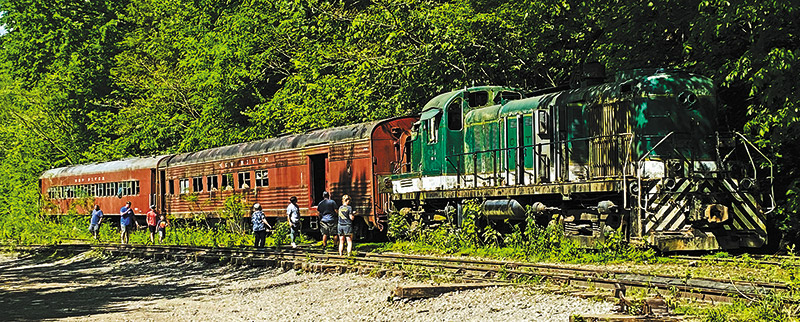Economic-impact study could help decide fate of historic railroad line

The abandoned New River Scenic Railroad excursion train sits on a siding of the historic Tennessee Railroad behind an old coal preparation plant in Devonia in remote southwest Anderson County. (photo:G. Chambers Williams III )
EPA and the Tennessee Department of Environment and Conservation came up with the money for the study and hired Gregory A. Jones of Pittsburgh-based Civil & Environmental Consultants, Inc., to conduct the study, Frank said.
“The analysis is looking at the impact for keeping the rail line alive/operational and any potential positive tourist impacts, or the economic impact of a trail if the line is removed and converted to trails,” the mayor said.
“We are so very thankful for the EPA and this incredible opportunity.”
No timetable has been released yet for completion of the study, but it’s a key additional step in the efforts of Anderson, Campbell and Scott counties to keep the 42-mile former Tennessee Railroad line – which dates to the late 1800s – from being destroyed and removed by its current owner, the R.J. Corman Railroad of Nicholasville, Kentucky.
The three counties, which make up the North East Tennessee Rail Authority, have been working for more than three years to try to save the rail line, which Corman has asked the U.S. Surface Transportation Board for permission to abandon.
Last May, the Surface Transportation Board approved the abandonment of the rail line, which runs from Oneida to Devonia, in remote Anderson County, largely following the route of the New River.
But the three counties have managed to keep the abandonment at bay with multiple challenges before the STB, which so far has stopped Corman from pulling up the tracks and closing the line permanently.
In a 4-1 decision, the STB denied an appeal by an Arkansas railroad company to allow it to buy the line from Corman using a process through the STB that would have forced the sale.
Arkansas-Oklahoma Railroad Co., which has since pulled out of the fight over the line, originally proposed to buy the line and rehabilitate it for proposed new freight customers. The line has been dormant since 2013, when the last customer – a coal-mining operation in the Devonia area – shut down.
Last January, Arkansas-Oklahoma Railroad failed in an attempt to reach an agreement with R.J. Corman to purchase the line outside the STB’s Offer of Financial Assistance program, through mediation that had been ordered by the STB.
The mediators said that despite two meetings with R.J. Corman Railroad and Arkansas-Oklahoma Railroad, “the parties ultimately were not able to reach a settlement,” and “the mediation has ended.”
The line had been used extensively for coal and timber operations in the region, but trains last ran on the tracks in 2013, when a coal mine at Devonia shut down. A tourist train, the New River Scenic Railroad, operated briefly on the line between Huntsville and Devonia, but was shut down by R.J. Corman in 2010 shortly after Corman bought the line from Knoxville-based National Coal Co.
The line was owned by the Southern Railway Co. and later Norfolk Southern Railroad before being sold to National Coal Co.
